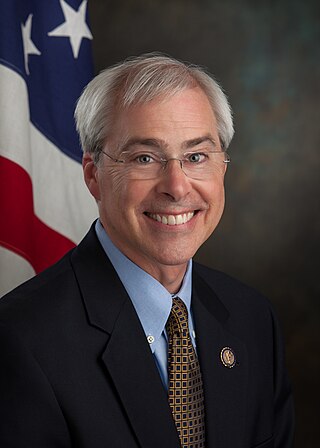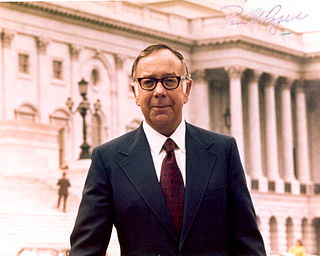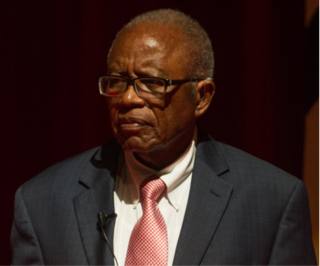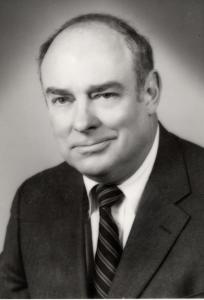
Horace Julian Bond was an American social activist, leader of the civil rights movement, politician, professor, and writer. While he was a student at Morehouse College in Atlanta, Georgia, during the early 1960s, he helped establish the Student Nonviolent Coordinating Committee (SNCC). In 1971, he co-founded the Southern Poverty Law Center in Montgomery, Alabama, and served as its first president for nearly a decade.

Kweisi Mfume is an American politician who is the U.S. representative for Maryland's 7th congressional district, first serving from 1987 to 1996 and again since 2020. A member of the Democratic Party, Mfume first left his seat to become the president and CEO of the National Association for the Advancement of Colored People (NAACP), a position he held from 1996 to 2004. In 2006, he ran for the U.S. Senate seat being vacated by Paul Sarbanes, narrowly losing the Democratic primary to the eventual winner, Ben Cardin. Mfume returned to his former House seat in 2020 after it was left vacant by the death of Elijah Cummings.

John Jenkins Barrow is an American politician who was the U.S. representative for Georgia's 12th congressional district from 2005 to 2015. The district includes much of the Georgia side of the Central Savannah River Area and includes counties as far south as Coffee County and as far west as Laurens County. He is a member of the Democratic Party.

Paul Grant Rogers was an American lawyer and politician from the U.S. state of Florida. A Democrat, Rogers served in the U.S. House of Representatives as the member from Florida's 11th congressional district. He was chairman of Research America from 1996 to 2005.

Willye F. Clayton Dennis was an American librarian, civil rights activist and Florida state legislator. She was the first African-American Chief of Children's Services for the Jacksonville Public Library System. She was elected president of the Jacksonville branch of the National Association for the Advancement of Colored People, president of the Jacksonville Alumnae Chapter of Delta Sigma Theta and elected to the 15th District of the Florida House of Representatives for two terms.
Xernona Clayton Brady is an American civil rights leader and broadcasting executive. During the Civil Rights Movement, she worked for the National Urban League and Southern Christian Leadership Conference, where she became involved in the work of Dr. Martin Luther King Jr. Later, Clayton went into television, where she became the first African American from the southern United States to host a daily prime time talk show. She became corporate vice president for Turner Broadcasting.

Fred David Gray is an American civil rights attorney, preacher, activist, and state legislator from Alabama. He handled many prominent civil rights cases, such as Browder v. Gayle, and was elected to the Alabama House of Representatives in 1970, along with Thomas Reed, both from Tuskegee. They were the first black state legislators in Alabama in the 20th century. He served as the president of the National Bar Association in 1985, and in 2001 was elected as the first African-American President of the Alabama State Bar.

Elonnie J. Josey was an African-American activist and librarian. Josey was the first chair of the Black Caucus of the American Library Association, having been instrumental in its formation in 1970; served as president of the American Library Association from 1984 to 1985; and was the author of over 400 books and other publications.

Theodore Roosevelt Mason Howard was an American civil rights leader, fraternal organization leader, entrepreneur and surgeon. He was a mentor to activists such as Medgar Evers, Charles Evers, Fannie Lou Hamer, Amzie Moore, Aaron Henry, and Jesse Jackson, whose efforts gained local and national attention leading up to the civil rights movement of the 1960s.

Francys Johnson is an American civil rights attorney, pastor and educator. He is in private practice as an attorney in Statesboro, Georgia. He has lectured on constitutional and criminal law, civil rights and race and politics at Savannah State University and Georgia Southern University.

James Blaine Blayton was a prominent African-American physician in the Williamsburg, Virginia, area who lived in the Grove community in adjacent James City County. He practiced medicine for more than 50 years, and was also a civic leader.

Louis Tompkins Wright, MD, FACS was an American surgeon and civil rights activist. In his position at Harlem Hospital he was the first African-American on the surgical staff of a non-segregated hospital in New York City. He was influential for his medical research as well as his efforts pushing for racial equality in medicine and involvement with the National Association for the Advancement of Colored People (NAACP), which he served as chairman for nearly two decades.
Earl Theodore Shinhoster was a Black civil rights activist in Savannah, Georgia.

Julius Curtis Lewis Jr., often known as J.C. Lewis Jr., was an American businessman, philanthropist and Chairman of J.C. Lewis Enterprises, Lewis Broadcasting Corporation, J.C. Lewis Investment Company, and Island Investments. He served one term as Mayor of Savannah in the late 1960s as a Republican.

Larry Dwight Hall is a North Carolina government official. A longtime member of the North Carolina House of Representatives, he served as Secretary of the North Carolina Department of Military and Veterans Affairs under Governor Roy Cooper from 2017 through January 2021.

Augusta, Georgia was founded in 1736 as part of the British colony of Georgia, under the supervision of colony founder James Oglethorpe. It was the colony's second established town, after Savannah. Today, Augusta is the third-largest city in Georgia, and the largest city of the Central Savannah River Area.
Herman Archibald Johnson was an American businessman.

The National Association for the Advancement of Colored People (NAACP) is a civil rights organization in the United States, formed in 1909 as an interracial endeavor to advance justice for African Americans by a group including W. E. B. Du Bois, Mary White Ovington, Moorfield Storey and Ida B. Wells. Over the years, leaders of the organization have included Thurgood Marshall and Roy Wilkins.
Wilson Marcy Powell Sr. was a Harvard-educated lawyer, president of New York Hospital and vice-president of the New York City Bar Association.
Robert Edward Robinson was a lawyer, civil rights activist, and city councilmember in Savannah, Georgia. As a teenager, Robinson was involved in the integration of the city's school system and was part of a demonstration that contributed to the desegregation of Savannah Beach. He would later gain his Juris Doctor degree from the University of Georgia School of Law and practice law in Savannah, where he also was elected to the city council. He was murdered in 1989 by a mail bomb sent by Walter Moody, who would later be found guilty of murdering United States federal judge Robert Smith Vance in another mail bombing.














